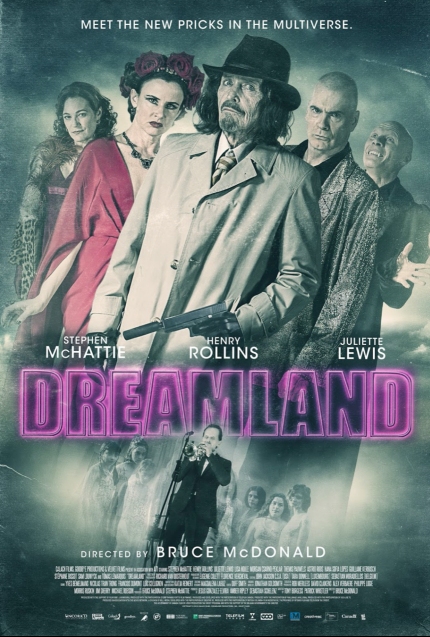Review: DREAMLAND, Where the Chaos Is Somewhat Under Control
Filmmaker Bruce McDonad's absurdly hypnotic hodgepodge of violent escapism stars Stephen McHattie, Juliette Lewis and Tomas Lemarquis.

In Dreamland, the ubiquitous Stephen McHattie plays a weary, nameless, assassin, who does the dirty work for a mid-level gangster named Hercules.
Disgusted to find out that his boss is getting into the human trafficking of young children involving the local aristocracy (Juliette Lewis pitched at 11), the assassin is tasked with the petty, spiteful act of chopping off the pinky finger of an American trumpet maestro (also played by McHattie). Instead, he has lunch with the musician, and rethinks his life in the hitman business. One of the kidnapped young girls is due to marry the creepy vampiric Count (Tomas Lemarquis in full Max Schreck Nosferatu mode) and the Maestro is to provide the soundtrack to the affair.
What is an assassin in the middle of an existential crisis to do? Procure a severed-finger from someone else, enlist the talents of the local barfly and femme fatale as backup, and get down to the business of killing the one-percent crime-royalty cabal with the possibility of living happily ever after in blissful atonement for past sins.
Prolific director Bruce McDonald has always defied easy categorization. Rock & Roll road pictures, documentary love-letters to Toronto, dark character comedies, a cult Slacker TV show, a beloved First Nations youth drama that eventually became a TV show, and the best Canadian zombie movie that is not technically about zombies, as much as it about language and media. As the story goes, when he won a major Toronto film prize of $25,000 for his debut feature, Roadkill, back in 1989, he declared he would spend it on “the biggest chunk of hash” he could find. The man is a bit of a rebel, and the cinematic equivalent of a garage musician who has fun experimenting with the medium.
With a chunk of money from the Film Fund Luxembourg, and a free floating screenplay from Tony Burgess, (who also wrote the aforementioned etymological zombie movie Pontypool) Dreamland traffics in the images and fragments of genre movies — organized crime, regretful hitmen, European palaces, femme fatales, drug addled musicians, vampires, Henry Rollins in a top hat and tails, and guns, guns, guns (even the children have guns) — but it steadfastly refuses to form any kind of expected sentences. With elliptical dialogue like “We start out as a bunch of people but we end up as one,” the film wants you to roll with its reverie.
Dreamland begins in lurid colour with large typefaces, and blazing neon, and slowly evolves into a near monochrome set-piece. Why not? It riffs on the lowest, drug addled point of trumpet player Chet Baker, when the musician hit rock bottom in Europe, and flirts, at one point, with the child-gangster imagery of Alan Parker's Bugsy Malone. You see McHattie shoot a lot of people, and also sing a melancholic ditty during the carnage. It is not deep, but it is deeply weird and enjoyable on its own merits. The proverbial, ‘And now for something completely different,’ the movie abounds with colourful asides, and tangential scenes that exist merely for their own merit. A pawn shop plays into the plot at a few points, the dryly feuding husband and wife owners are a hoot.
An absurdly hypnotic hodgepodge of violent escapism would never be for everyones taste, but Dreamland is blazingly, almost foolhardily, committed to what it is, and absent of cynicism or anything to prove. It is a cinema-frappé of dream logic, and yet retains coherence because the visual language is familiar. The chaos here is mutely under control, requiring little explanation or interpretation. You do not interpret a river constrained by high banks. You float on it. Float on.
Review originally published during Fantasia in July 2019. The film will receive a national release in Canada starting on Friday, May 29, via AppleTV, Bell, Cineplex, Cogeco, Rogers, Shaw, and Telus.







